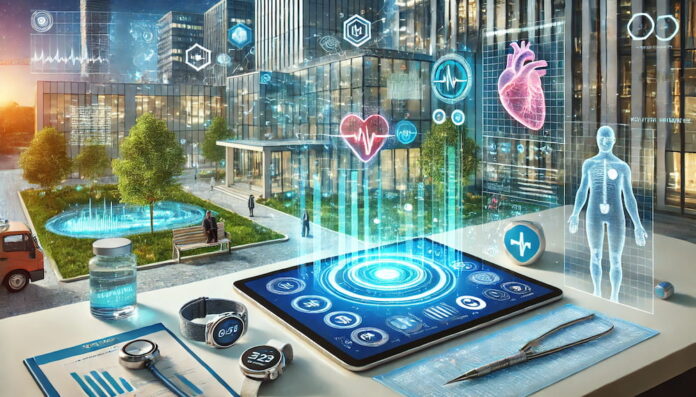The healthcare landscape is undergoing a seismic shift with the advent of digital health technologies. These innovations are not just modern conveniences; they are transformative tools that bridge gaps in accessibility, improve patient outcomes, and empower individuals to take charge of their health. From wearable devices to telehealth and artificial intelligence, digital health is creating a paradigm shift in how care is delivered and experienced.
A New Era of Connectivity in Healthcare
One of the most significant advancements in digital health is the integration of telemedicine. Telehealth platforms have revolutionized how patients interact with healthcare providers, offering virtual consultations that reduce the need for in-person visits. This development proved particularly crucial during the COVID-19 pandemic, as healthcare systems worldwide scrambled to provide safe and accessible care amidst lockdowns and restrictions.
Telemedicine is especially beneficial for managing chronic conditions such as diabetes, hypertension, or asthma. Patients can schedule regular check-ups with their private GP from the comfort of their homes, ensuring continuity of care without logistical hurdles like commuting or taking time off work. These virtual consultations have proven effective in improving patient adherence to treatment plans, ultimately reducing hospital admissions and emergency visits.
Facilities like Spital Clinic have embraced this new reality by offering telehealth options, ensuring that patients have access to trusted medical advice and care, even when they cannot visit in person. While maintaining the personal touch that defines quality healthcare, clinics like these are leading the way in adopting a hybrid model of in-person and digital consultations.
Wearable Technology: Your Health at a Glance
Wearable health devices have become a staple of modern health monitoring, and their role in preventive care cannot be overstated. From smartwatches that track heart rates and sleep patterns to fitness trackers capable of detecting irregular heart rhythms, wearable technology enables real-time health insights for users. These devices empower individuals to take proactive steps toward better health by providing them with actionable data.
For specific patient groups, such as pregnant women, digital health innovations extend even further. Combining wearable technology with ultrasound services allows clinics to monitor fetal wellbeing remotely. Remote monitoring tools, coupled with regular ultrasound check-ups, offer reassurance to expectant mothers while enabling clinicians to detect early signs of complications. This integration of wearable technology with diagnostic tools exemplifies how digital health is enhancing patient experiences in specialized areas of medicine.
AI and Big Data: Predictive and Personalized Medicine
Artificial intelligence (AI) is another revolutionary force in digital health, powering advancements in predictive analytics and personalized care. AI algorithms analyze vast amounts of patient data to identify patterns and trends, enabling clinicians to predict disease risks and tailor interventions. For example, AI can predict the likelihood of a patient developing diabetes or cardiovascular disease based on their medical history and lifestyle factors.
At facilities like Spital Clinic, AI-powered tools are integrated into patient care pathways, helping private GPs determine which patients may benefit from advanced diagnostic imaging, such as targeted ultrasounds. This approach ensures that clinicians have a detailed view of potential health issues, enabling them to make informed decisions that improve patient outcomes.
AI’s role also extends to managing healthcare workflows. By automating routine administrative tasks, AI frees up valuable time for healthcare professionals to focus on patient care. This efficiency not only reduces costs but also enhances the quality of service delivery.
Remote Diagnostics and Digital Therapeutics
Another exciting development in digital health is the rise of remote diagnostics and digital therapeutics. Remote diagnostic tools enable patients to perform basic health checks at home and share the results with their healthcare providers in real time. These tools are particularly valuable in managing conditions like hypertension and diabetes, where continuous monitoring is critical.
Digital therapeutics, on the other hand, use software-based interventions to treat and manage diseases. These applications, often prescribed by healthcare providers, can deliver cognitive-behavioral therapy for mental health conditions or provide structured exercise programs for patients recovering from injuries. Such innovations complement traditional medical treatments, creating a more holistic approach to care.
Challenges in Digital Health Adoption
Despite its promise, digital health faces several challenges that must be addressed for widespread adoption. Data privacy and security are among the top concerns, with stringent regulations such as the General Data Protection Regulation (GDPR) in Europe requiring healthcare providers to implement robust cybersecurity measures. Ensuring the safety and confidentiality of patient data is critical for maintaining trust in digital health systems.
Another challenge is the digital divide. Not all patients have access to smartphones, wearable devices, or stable internet connections, limiting the reach of digital health solutions. Bridging this gap requires targeted efforts to provide affordable technology and improve digital literacy among underserved populations.
The Future of Digital Health
As digital health technologies continue to evolve, their potential to transform healthcare becomes increasingly apparent. From virtual consultations and AI-driven diagnostics to wearable devices and digital therapeutics, these advancements are creating a more connected, efficient, and patient-centered healthcare system.
Facilities that embrace these innovations, such as those offering private GP and ultrasound services, are at the forefront of this revolution. By combining cutting-edge technology with compassionate care, clinics like Spital Clinic are ensuring that patients receive the best of both worlds—advanced medical expertise and a personalized approach to health.
The journey toward a fully digital healthcare ecosystem is still underway, but the progress made so far demonstrates the immense potential of these technologies. By addressing the challenges and harnessing the power of innovation, the future of healthcare looks brighter than ever.
Did you find this helpful? Check out our other helpful articles on our website.
Read Also
- How to Find a 5-Star Dentist Near YouChoosing a dentist is more than just finding someone who can clean your teeth. It’s about selecting a trusted partner in your long-term oral health. A 5-star dentist not only provides excellent clinical care but also delivers a positive patient experience, from the moment you walk in until the moment you leave. Whether you’re new… Read more: How to Find a 5-Star Dentist Near You
- Your Easy-Peasy Guide to Brewing Amazing MatchaHey there! So, you’ve heard all the buzz about matcha – that vibrant green powder that’s not just pretty but packed with good stuff? It can seem a little fancy and intimidating at first, but trust me, making a delicious cup at home is simpler than you think. Forget complicated ceremonies for now; let’s just… Read more: Your Easy-Peasy Guide to Brewing Amazing Matcha
- Embracing Holistic Wellness: Insights from a Lansing, MI Health CenterReframing Health: Moving Beyond Symptom Management Treating only symptoms often offers quick relief, yet long-term results stay out of reach. When care zeroes in on isolated complaints, the bigger picture, such as stress, behavior, or lifestyle, often gets missed. Research shows that whole-person care, which looks at physical, emotional, and environmental factors, yields better outcomes… Read more: Embracing Holistic Wellness: Insights from a Lansing, MI Health Center
- VO₂ Max Testing Explained: What It Is & Why It Matters for Your HealthVO₂ max sounds like a term reserved for elite athletes, but it’s among the most accurate measures of your lifetime and general condition. Moreover, it goes beyond performance. Monitoring your VO₂ max will help you to ascertain your body’s capacity to control stress, its oxygen consumption efficiency, and your internal ageing process. If you have… Read more: VO₂ Max Testing Explained: What It Is & Why It Matters for Your Health
- So, what exactly is matcha?Think of matcha as green tea turned up to eleven! Instead of steeping leaves and tossing them out, matcha is made by grinding whole green tea leaves into this super-fine, vibrant green powder. You whisk it right into hot water (or milk!), meaning you’re drinking the entire leaf. That’s why folks say you get way… Read more: So, what exactly is matcha?
- How to Tell When It’s Time for Professional Senior Care SupportCaring for an aging loved one is a journey filled with love, patience, and difficult decisions. One of the toughest choices families face is knowing when it’s time to seek extra help. In this article, trusted Los Angeles caregivers for seniors explore the signs that it might be time to bring in professional support, not… Read more: How to Tell When It’s Time for Professional Senior Care Support
- Reporting a Work Injury: What Deadlines You Need to KnowAfter a workplace injury, time isn’t always on your side. Many employees aren’t aware that there are strict deadlines for reporting a work-related injury, and missing that window can put your entire claim at risk. Whether your injury was sudden or developed gradually over time, it’s essential to act quickly and follow the proper steps.… Read more: Reporting a Work Injury: What Deadlines You Need to Know
- How All-on-4 Can Transform Your Smile (and Confidence)If you’ve been living with missing teeth, uncomfortable dentures, or declining oral health, you know how much it can affect your self-esteem. All-on-4 dental implants offer more than just a full set of teeth — they offer a renewed sense of confidence and quality of life. With a streamlined treatment process and reliable, long-term results,… Read more: How All-on-4 Can Transform Your Smile (and Confidence)









